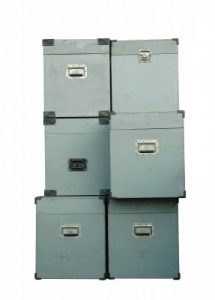It would be a nightmare if I’d gotten this call before we started TruckingOffice. A bill that’s almost 6 months overdue is being contested because they claim they hadn’t gotten the bill of lading.
In the old days, first I would have had to go through my spreadsheets to find the bill, then I would have had to sort through several boxes of files to find the paper copy. Then I’d have to make a copy and send it again, along with another invoice, and hope they got it right this time. Waiting six months for a $5,000 payment is painful.
There’s a lot of discussion about keeping paper records or going all to electronic copy records. In my experience, going all to electronic copy records with TruckingOffice was the best thing I’ve ever done as a trucker or a broker. All the headaches that paperwork creates are gone. I can search my computer or my email a lot faster than I can pull out old boxes from the closet when I need to find something in my records.
Did You Say Email?
Yes, I said email. I’ve found that using Google email, I have control over my bills of lading. I take a picture of the bill of lading or ask my driver to get one and send it to me along with the shipment number. I can bill far faster by sending the bill of lading picture along with an electronic invoice than I ever could with paper. I don’t have to wait.
I’m asked sometimes what do truckers need to keep? There are some rules from DOT that say we have to keep our truck logbooks for 6 months. Other tax-related information needs to be kept for at least seven years. But do we have to keep the paper?
Not necessarily. By using a good scanner and a hard drive with a backup, most people will find they’ve got all they need when they go to a paperless system. You can store years’ worth of data on a computer or even in the Cloud, a fancy name for online storage that you can purchase from Google or Amazon.
Why Move to Electronic Copy?
You can always do both, if you’re not comfortable with having just computer records. But as time goes on, it’s getting less and less of an issue. The government accepts our computer files now. Businesses are moving to exclusively computer and electronic systems, With the use of electronic log books, paper records won’t be used much longer. Considering how much faster you can get paid by sending an electronic invoice, making the switch is good sense.
It helps to create a good system on the computer. There are many ways for you to do it. Keep the records in a folder according to the shipper, or according to the year. You might even come up with your own system. It’s what works for you that’s most important.
You should follow the general accounting rules for what you should keep and how long to keep it. In general, the IRS expects records to be kept for seven years. But as we see more and more electronic communications, keeping records electronically is a great way to reduce the amount of space needed. Instead of a year’s worth of paper stuck into a file cabinet, scanning records and keeping them secure on a hard drive or in the cloud looks a lot more doable. Google lets you keep huge amounts of data in the cloud at little or no cost – just be sure you’ve got good backups.
TruckingOffice makes it easy. Let us show you with a 30 day free trial. Put in a week’s worth of loads and data and see how simple TruckingOffice can be.








Recent Comments